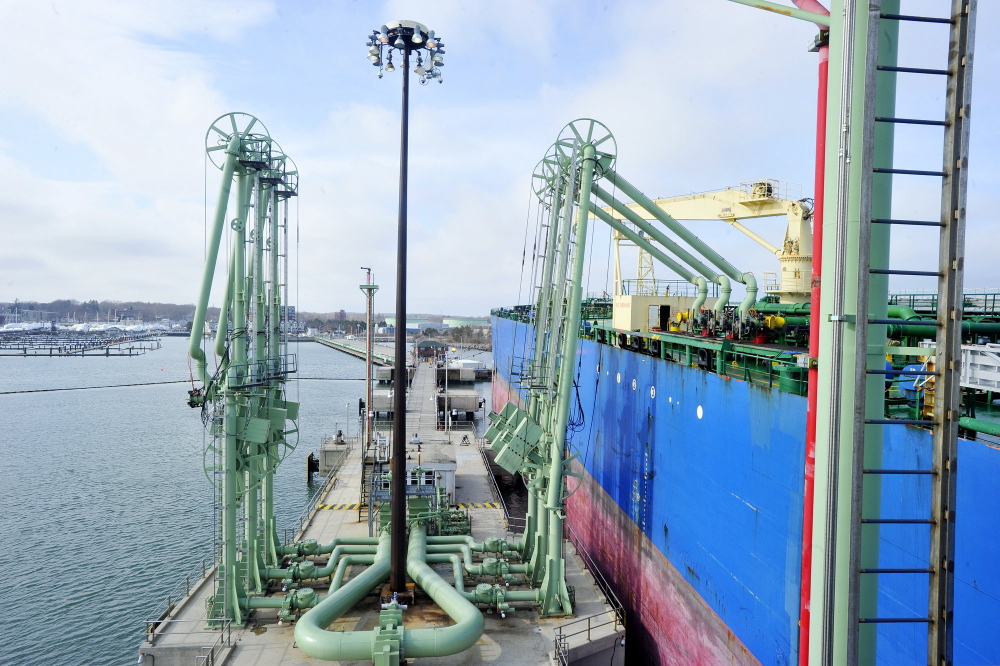SOUTH PORTLAND — The city has asked a federal judge to dismiss a lawsuit by the Portland Pipe Line Corp., saying that the company cannot claim damages from a city ordinance because it has “no current plans” to reverse the flow of the pipeline to bring Canadian crude oil to Portland Harbor.
The city is defending its Clear Skies ordinance, approved last summer, which bans loading crude oil into tankers in the harbor and effectively prevents the company from reversing the flow of its South Portland-to-Montreal pipeline to bring Canadian tar sands oil into Maine.
The city’s lawyers contend that the company has jumped the gun in claiming the ordinance violates its constitutional rights, federal statutes and maritime laws, noting that the company’s concern is to maintain its future ability to “respond to market conditions,” according to a motion filed Tuesday in U.S. District Court.
The city, for its part, is acting “to protect the health and welfare of its residents and visitors and traditional land use authority to promote future development consistent with the comprehensive plan,” according to the motion.
MARKET CONDITIONS RAISE STAKES
The lawsuit has the potential to become a high-profile case that could take several years to play out and cost untold tax dollars. As host of the pipeline terminal, South Portland has thrust itself into a struggle between the oil industry and environmental advocates who argue that Canada’s development and production of tar sands oil poses long-term risks for the environment. The city has set up a fund to collect donations to help cover the legal bills.
The city’s defense team is led by Jonathan Ettinger, a prominent environmental lawyer with Foley Hoag in Boston, and includes the city’s corporation counsel, Sally Daggett of Jensen Baird Gardner & Henry in Portland. The company’s defense team is led by Catherine Connors and Matthew Manahan of Pierce Atwood in Portland.
Both sides declined to comment on the case Wednesday.
Pipeline executives insisted throughout the ordinance review process that the company had no contracts and no plans to reverse the flow of the pipeline. However, significant changes in energy markets have led to steep declines in the volume of crude oil pumped from South Portland to Montreal, threatening the pipeline’s future viability and raising concern that the company may move to reverse its flow to take advantage of new crude oil production in western Canada.
The company sought and received federal, state and local permits required to reverse the pipeline’s flow in 2008 and 2009, but those permits have since been revoked or surrendered.
The company owns and operates the U.S. portion of a fuel-transportation system that includes 18-inch-diameter and 24-inch-diameter pipelines, according to the lawsuit. Currently, about 48 ships per year offload about 2.4 million total barrels of crude oil per month, or nearly 29 million barrels annually, at piers in South Portland for transport to Montreal. The 18-inch pipe is idle and the 24-inch pipeline is handling far less than its capacity of 410,000 barrels per day, or nearly 150 million barrels annually.
The City Council approved the Clear Skies ordinance in July, eight months after South Portland voters rejected a proposal that would have allowed only the unloading of oil in South Portland.
Supporters of the ordinance said reversing the pipeline could increase the risk of spills and would require the construction of smokestacks next to Bug Light Park to burn off gases associated with loading diluted bitumen – otherwise known as tar sands oil – from the pipeline onto tankers.
Opponents said those concerns were unfounded and worried that the ordinance would hurt an important employer and taxpayer in the city.
ANCHOR OF PETROLEUM ACTIVITIES
In the lawsuit, filed Feb. 6 in U.S. District Court in Portland, the company claims that the ordinance is unconstitutional because it interferes with interstate trade, discriminates against Canadian interests, devalues the pipeline and infringes on areas best left to the federal government.
Despite the pipeline’s flagging use, the oil terminal industry “serves as the anchor” for commercial petroleum-handling activities for the Port of Portland, accounting for 84 percent of its cargo vessels and 94 percent of its total cargo, according to the lawsuit. Those activities generate $64 million in sales annually and support 335 jobs that pay over $20 million per year in salaries and benefits.
The company is joined in challenging the ordinance by the American Waterways Operators, a trade association representing the tugboat, towboat and barge industry.
This story was corrected at 3:30 p.m. on Sunday, April 5 to clarify the amount of oil flowing through the pipeline to Montreal.
Kelley Bouchard can be contacted at 791-6328 or at:
Twitter: KelleyBouchard
Send questions/comments to the editors.



Success. Please wait for the page to reload. If the page does not reload within 5 seconds, please refresh the page.
Enter your email and password to access comments.
Hi, to comment on stories you must . This profile is in addition to your subscription and website login.
Already have a commenting profile? .
Invalid username/password.
Please check your email to confirm and complete your registration.
Only subscribers are eligible to post comments. Please subscribe or login first for digital access. Here’s why.
Use the form below to reset your password. When you've submitted your account email, we will send an email with a reset code.